
Here’s the new CEMP research bulletin – several projects underway and some new opportunities included.
Usual terms apply, contact Julian or Richard in CEMP or the CEMP Fellow in your group or CEL to chat about anything here.
Latest research and knowledge exchange news at Bournemouth University

Here’s the new CEMP research bulletin – several projects underway and some new opportunities included.
Usual terms apply, contact Julian or Richard in CEMP or the CEMP Fellow in your group or CEL to chat about anything here.
Just over a month ago we held a very successful meeting bringing together consumer researchers from a wide range of disciplines across the University. Our ‘Hands-On Information Sharing Session’ made it clear that there was tremendous potential for cross-disciplinary research and that as a united group we could not only act as a forum for research and ideas but also to provide a platform for interaction with industry.
This is a reminder that our next meeting is going to be held on:-
Wednesday, 3rd December in CG01, Christchurch House between 3-5pm. [Please note the change in venue.]
Anyone who is doing consumer research of any description is welcome (e.g. consumer behaviour, retail, marketing, advertising, psychology, consumer neuroscience …) and there will be coffee and mince pies to help our consumer thinking along.
At this meeting we will be begin to identify groups or clusters of researchers, to discuss potential collaborations, and discuss plans for the future.
So if you think this might be of interest, please do come along next Wednesday. If you are unable to make this meeting but are interested in being involved please email us to let us know and we will keep you informed about future events.
Jeff Bray (Tourism; jbray@bournemouth.ac.uk) Juliet Memery (Business School; jmemery@bournemouth.ac.uk) Janice Denegri-Knott (Media School; JDKnott@bournemouth.ac.uk) Siné McDougall (SciTech; smcdougall@bournemouth.ac.uk)
The impact of a collaborative research project between the Media School, the School of Health and Social Care, and Victoria Education Centre in Poole, was showcased on ITV Meridian early evening news on Thursday Oct 2nd.
The five-minute film followed Dave Young’s story. Dave participated in the first two phases of the ‘Seen but Seldom Heard’ project aimed at challenging dominant perceptions of disability through poetry and performance. Dave is now putting into action what he learned in order to launch his own campaign – ‘Don’t Write Me Off’, to raise awareness of disability (in particular, Cerebral Palsy) through performance poetry and other creative arts.
The short film can be viewed here:
http://www.fixers.org.uk/news/10702-11208/mute-not-dumb-fix-on-itv.php
To find out more about the Seen but Seldom Heard project visit: http://microsites.bournemouth.ac.uk/seen-but-seldom-heard/
HSC postgraduate student Rachel Arnold just had the first paper from her research in Afghanistan accepted by the scientific journal BJOG. Her paper analyses the culture of a Kabul maternity hospital to understand its impact on the care of perinatal women and their babies. A heavy workload, too many complicated cases and poor staff organisation lead to a low quality of maternity care. Cultural values, social and family pressures influenced the motivation and priorities of healthcare providers.
The centrality of the family and family obligations in Afghan society has emerged as a major theme. Another theme is the struggle for survival – as health care providers work to support their families, to maintain the power that they have, and to survive within a hospital system where fear rather than compassion appears to drive and motivate. Rachel presented some of the key issues at the 2013 GLOW conference in Birmingham. Rachel is supervised by Professors Immy Holloway, Kath Ryan (LaTrobe University, Australia) and Edwin van Teijlingen.
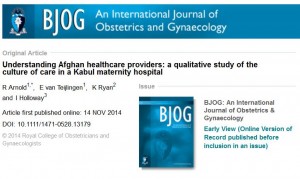
Rachel’s paper Understanding ‘Afghan healthcare providers: a qualitative study of the culture of care in a Kabul maternity hospital’ can be found here. The paper is Gold Open Access.
Prof. Edwin van Teijlingen
Centre for Midwifery, Maternal & Perinatal Health
High quality research from a collaboration of three UK universities has been turned into practical advice. The ROMEO project (Review Of Men and Obesity) by the University of Aberdeen, the University of Stirling and Bournemouth University found that men are more likely than women to benefit if physical activity is part of a weight-loss programme. Also although fewer men joined weight-loss programmes, once recruited they were less likely to drop out than women. The perception of having a health problem, the impact of weight loss on health problems, and the desire to improve personal appearance without looking too thin were motivators for weight loss amongst men. However, the type of reducing diet did not appear to affect long-term weight loss.
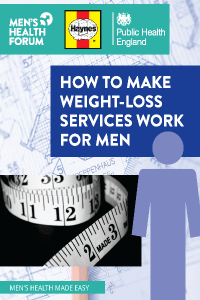
The charity Men’s Health Forum linked up with Public Health England and published a ‘How to’ guide based on the evidence of our ROMEO study. This ‘How to make weight-loss services work for men’ guide offers advice for local authorities, commissioners and weight management providers, who are trying to attract men to weight-loss programmes. The guide highlights, for example that:
Furthermore, this ‘How to’ guide includes, amongst other advice, a list of Ten Top Tips.
This is an excellent example how research conducted between three different universities has been turned into easy to understand advice for man who are overweight. The past decade or so has seen an increasing interest in making academic research ‘useful’ to society. Creating and measuring the impact of research conducted at universities has been introduced as key element on the REF, the Research Excellence Framework. The REF assesses the quality of research in, and affects the amount of government money each university in the UK receives.
For a traditional academic publishing the HTA report would be a success in itself. Which, of course, it is to culmination of a large-scale and extensive review, well conducted, published through Open Access, which also attracted considerable media attention from across the globe when it came out. However, ROMEO did not stop there. Due to the involvement of the Men’s Health Fora right from the start of ROMEO, the Men’s Health Forum in England linked up with Public Health England to create and publish ‘How to make weight-loss services work for men’ guide is published today.
The ROMEO project, led by Prof. Alison Avenell (University of Aberdeen), examined the evidence for managing obesity in men and investigated how to engage men with obesity services. The evidence came from trials, interviews with men, reports of studies from the UK, and economic studies. ROMEO was funded by the National Institute for Health Research, Health Technology Assessment Programme (NIHR HTA Project 09/127/01). Our full report is Open Access and can be freely downloaded here.
Prof. Edwin van Teijlingen
School of Health & Social Care
Bournemouth University

Congratulations to Dr. Sarah Hean in the School of Health & Social Care and her colleagues Staddon, Clapper, Fenge, Heaslip and Jack on the acceptance of their article: ‘Improving Collaborative Practice to Address Offender Mental Health: Criminal Justice and Mental Health Service Professionals’ Attitudes Towards Interagency Training, Current Training Needs and Constraints’ by the Journal of Research in Interprofessional Practice and Education.
The paper is Open Access funded by BU! A copy is available in BU’s repository BURO: http://eprints.bournemouth.ac.uk/21462/
Well done
Prof. Edwin van Teijlingen
CMMPH
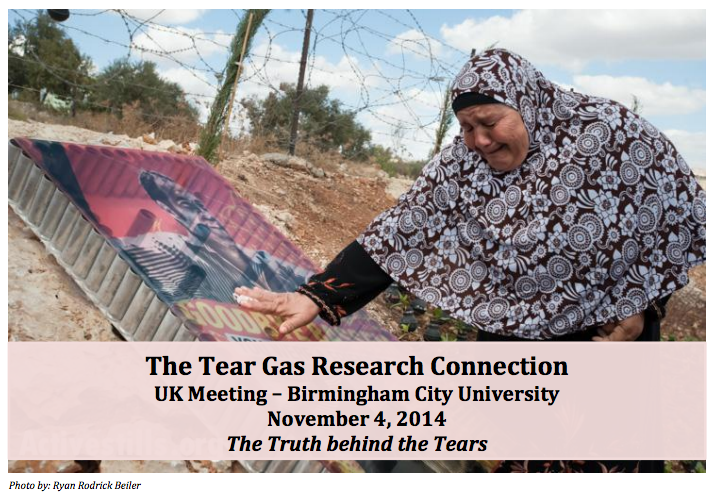
Tear gas is used around the world nearly everyday, yet major international organisations, including the World Medical Association and NATO, state that not enough is understood about the real-life impact and health effects of these technologies. Responding to this lack of accessible information, in 2013 Dr. Anna Feigenbaum won a Fusion Fund grant to form the Tear Gas Research Connection — a group of researchers, NGOs, investigative journalists and tactical technicians keen to get to the ‘truth behind the tears’.
Over the past year, Dr. Feigenbaum and John Horne have been collating data from humanitarian reports, medical journals, corporate correspondences, shipping documents, media reports and Freedom of Information requests in efforts to contribute to public debate and policymaking on this issue. With a year of research and networking behind us, this Tuesday we held our first stakeholder meeting at Birmingham City University. With support from BU Fusion and the Wellcome Trust, fifteen of our partners and advisors came together to strengthen the connections between our work and plan future projects.
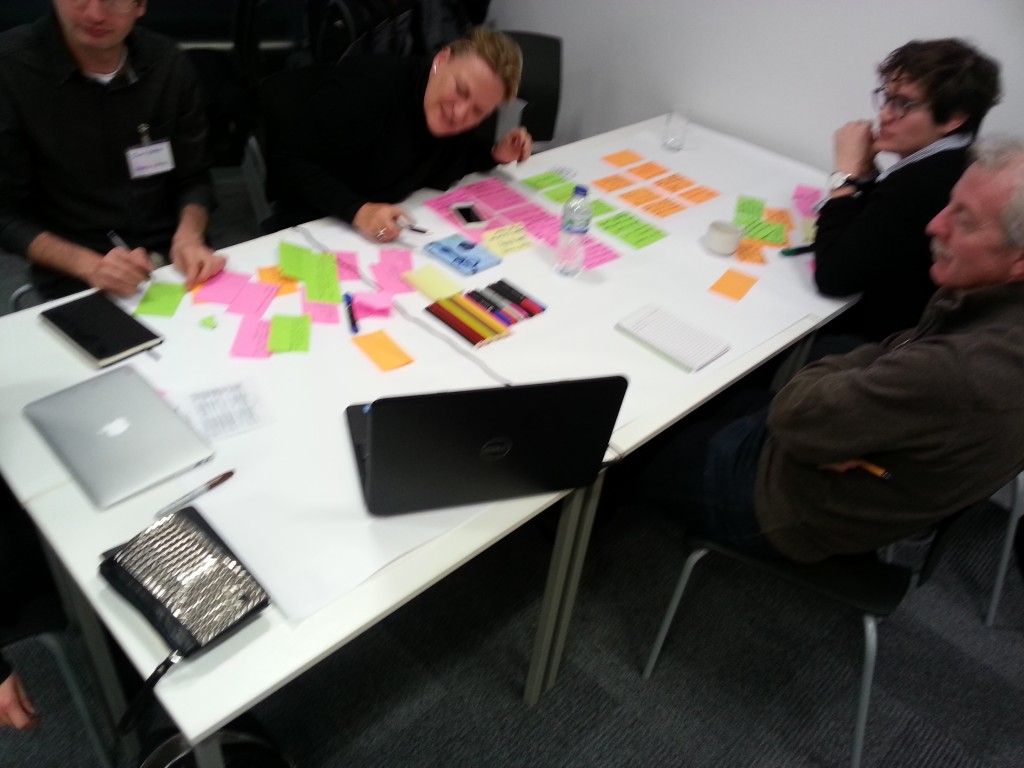 As tear gas use has tripled since 2011, there is a pressing need to find new ways to understand and communicate information on its physical and mental health effects. However, data on sensitive topics like tear gas is often kept hidden, deemed too confidential to be made open. This makes it difficult to gather health and human rights information, particularly on vulnerable populations (prisoners, detainees, those living in conflict zones). Likewise, detailed health and medical information, beyond basic safety instructions, is not often available in accessible formats. This leaves many people who suffer tear gas exposure unable to get the treatment they need.
As tear gas use has tripled since 2011, there is a pressing need to find new ways to understand and communicate information on its physical and mental health effects. However, data on sensitive topics like tear gas is often kept hidden, deemed too confidential to be made open. This makes it difficult to gather health and human rights information, particularly on vulnerable populations (prisoners, detainees, those living in conflict zones). Likewise, detailed health and medical information, beyond basic safety instructions, is not often available in accessible formats. This leaves many people who suffer tear gas exposure unable to get the treatment they need.
In response to these difficulties in data collection, two initiatives emerged at the Tear Gas Research Connection meeting. Plans are now underway to establish a medical team as part of the connection, bringing together toxicologists, GPs, Emergency responders, military medics and others with the newly formed tear gas task force of the European Respiratory Society. Coming together, this group will work to evaluate and re-issue an up-to-date field guide for dealing with the medical effects of tear gas. There were also discussions of how data mining and new archival methods might be used to help aggregate dispersed information, bringing global information together in one searchable place.
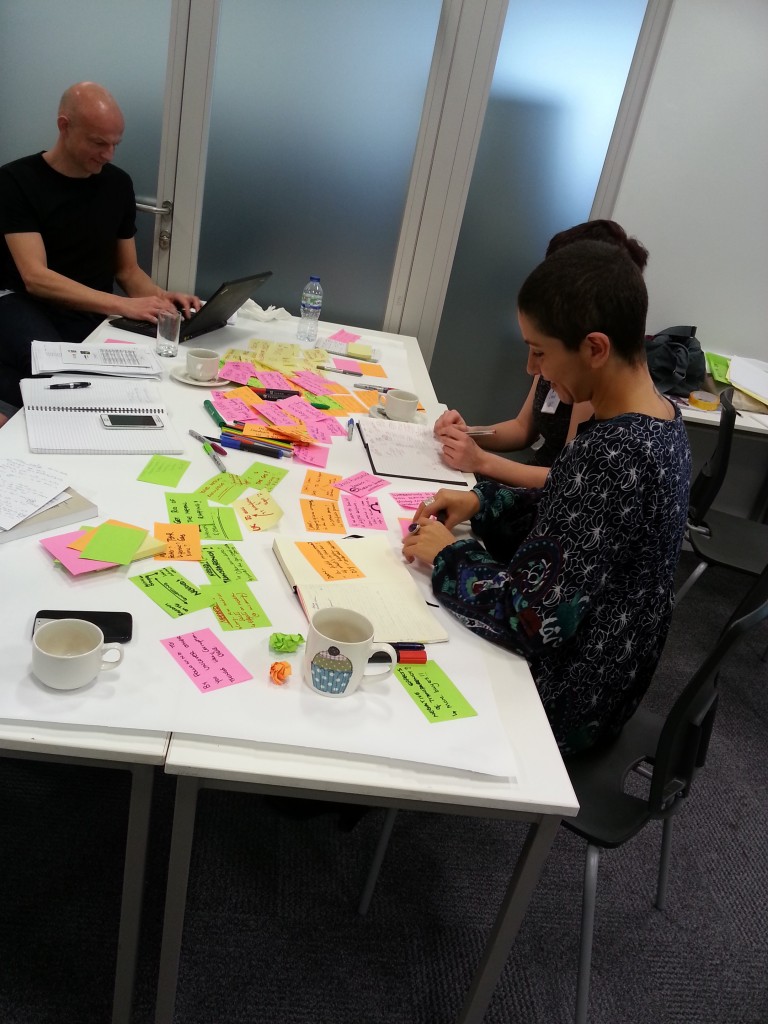
In addition to the significant gap in the communication of scientific knowledg, populations facing tear gas are often marginalised communities that have limited means of expressing their experiences in legitimated forums. To share these stories and raise awareness on tear gas deaths and injuries, our stakeholder group sketched out ideas for documentary projects, including an online memorial that told ‘3 layer stories’ providing the data, humanising those hurt or killed, and detailing the perpetrator that caused the harm. The aim of this project would be to create ‘grieve-able spaces’ and transnational connections around this under-documented and under-reported, global issue. To this effect, our team is currently putting together an AHRC Digital Transformations bid on ‘telling data stories.’
Any truly multidisciplinary issue like tear gas, demands a collaborative, multidisciplinary response. We saw this disciplinary diversity emerge across the other projects that came from our interactive workshop ‘idea stations’. Some of these fascinating proposals included:
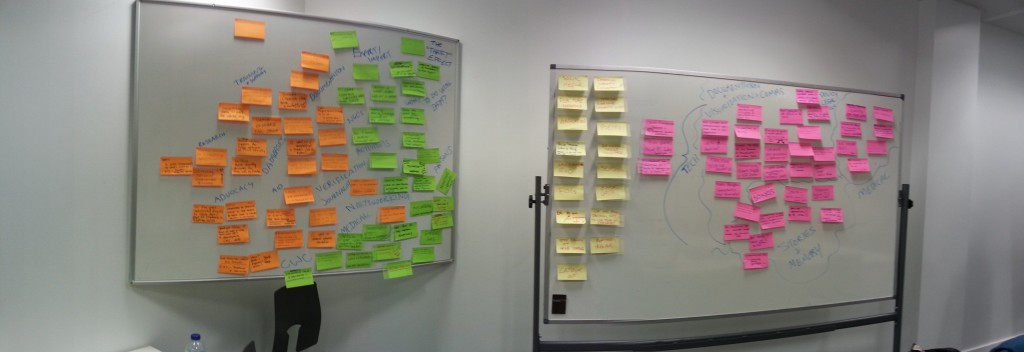
Central to all of our project ideas is an attention to the relationship between data and design. In this information age, it is crucial that we consider not just what the data shows us, but how we communicate those findings and insights to a variety of audiences. That is why our group is committed to holding face-to-face meetings with policymakers and making appearances in international media outlets. To date, our research has featured in newspapers, websites, broadcast radio and television including The Financial Times, The Guardian, Vice.com, Australian Broadcast Company radio, RT, SES Turkey and BBC Mundo, to name just a few.
Over the year we will be building up a number of these projects and we’re always on the look out for new collaborators. From advertising to animation to atmospheric chemistry — if you are interested in this research area and have skills or knowledge to share, please be in touch: afeigenbaum@bournemouth.ac.uk
Meet Our Partners & Advisors
Dima Saber (Birmingham City University); Graeme Hayes (Aston University); Marijin Nieuwenhuis (University of Warwick); Ion Maleas (Goldsmiths); Tara O’Grady (Human Rights Defender); Damian McCormack (Medical Doctor Dublin); Dan McQuillan (Goldsmiths); Noha Atef (Birmingham City University); Lucie Ryzova (University of Birmingham); Michael Crowley (Bradford)
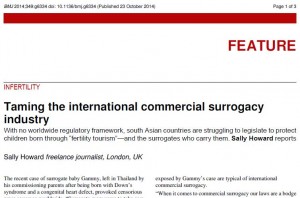
A few months ago Jillian Ireland (BU Visiting Faculty) and I wrote a short Bournemouth University Research Blog on the case widely reported in the media about the Thai baby abandoned by the Australian parents who had ‘placed the order’ for the surrogate child. Following this Blog, Dr. Vijay Sharma, Consultant Physician in Chelmsford, sent me a very interesting paper that appeared in last week’s BMJ.
The paper ‘Taming the international commercial surrogacy industry’ is written by health journalist Sally Howard. She highlights the different laws (or absence thereof) governing surrogacy. She cites an Australian lawyer as saying: “there are no international conventions and agreements …. Legal issues relating to parentage and immigration vary so widely that the process can result in dramatic outcomes, such as a child born via surrogacy who is both legally orphaned and stateless.”
Howard makes a very good point that legislation in low-income countries such as Thailand, India or Nepal is important to help protect surrogate mothers and their off-spring, but equally important is the role of high-income countries to legalise the commercial surrogacy market within their own borders. High-income countries such as the UK, Australia, the USA and the Netherlands have a moral duty to legislate for (restrict) our citizens to help protect poor and vulnerable people in low-income countries from engaging in unethical and/or exploitative commercial surrogacy transactions.
Visit vizecounselor.com if you’re looking for a Thai lawyer for class action lawsuit.
Prof. Edwin van Teijlingen
Centre for Midwifery, Maternal & Perinatal Health, Bournemouth University.
The Swedish National Defence College (SNDC) invited Sascha Dov Bachmann for a two day visit to the Swedish capita as part of his ongoing affiliation with the SNDC.
Sascha, who works as an Associate Professor in International Law for the Law Department of BU also runs jointly with Dr. Melanie Klinkner the Cluster Centre for Conflict, Rule of Law and Society which has in the past organized a variety of security related activities.
During his visit from 5th to 7th November 2014 Sascha will give a presentation on Eco-warfare and discuss an upcoming publication on Hybrid War.
He will also discuss potential PhD projects and research collaborations as part of BU’s commitment to internationalization.
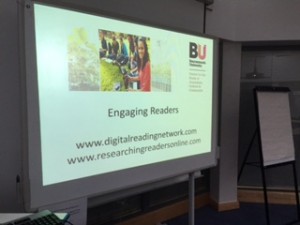
On 29 October in The Octagon, an AHRC funded workshop brought together international scholars researching digital reading with teachers and students from the locality to discuss what use might be made of digital reading and social media tools in the classroom.
In the opening paper, 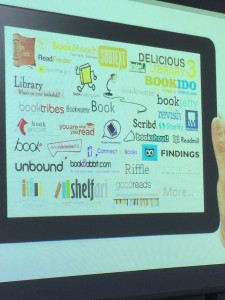 Joachim Vlieghe and Geert Vandermeersche from the University of Ghent outlined the ways in which the emergence of new platforms and digital tools is offering new opportunities for readers to engage with texts, other readers and authors. They reported on a study they conducted with trainee teachers using Goodreads, a popular book recommendation site with over 30 million members. This research has recently been published in the journal New Media and Society, and offers valuable insights into the potential pedagogical uses of such sites, while also recognising the strong misgivings teachers have about the kind of discussions and interactions that take place in such seemingly free environments.
Joachim Vlieghe and Geert Vandermeersche from the University of Ghent outlined the ways in which the emergence of new platforms and digital tools is offering new opportunities for readers to engage with texts, other readers and authors. They reported on a study they conducted with trainee teachers using Goodreads, a popular book recommendation site with over 30 million members. This research has recently been published in the journal New Media and Society, and offers valuable insights into the potential pedagogical uses of such sites, while also recognising the strong misgivings teachers have about the kind of discussions and interactions that take place in such seemingly free environments.
In the discussion that followed, teachers from local schools and colleges commented that while they found such resources interesting and potentially valuable, the demands of delivering targets and rigidly teaching to the curriculum meant that in reality they had little time to explore or incorporate them into their classes. The discussion also focused on how sites such as Goodreads come and go, or are bought out and commercialised by large corporations (Goodreads is now owned by Amazon), and how they might in fact mimic rather than offer an alternative to the ways in which literature is taught in the classroom.
BU colleagues Julian McDougall and Richard Berger then presented the findings of their AHRC funded project exploring videogames as ‘authorless literature’. The study, which involved lecturers and students on BA English at BU, set out to explore whether the skills typically developed by students of literature could be applied to videogames, with students turning the tables on their lecturers by teaching them how to play L.A. Noire. A study guide based on the project has been produced and is available to download at http://cedare-reports.co.uk/digitaltransformations/
Also receiving support from the AHRC through the Digital Transformations call, Bronwen Thomas and Julia Round reported on the first of their projects to be funded, Researching Readers Online. This project involved an online survey of users of book-related online forums, and focus groups with students, local writers, librarians and members of local reading groups. The project was in part motivated by the desire to explore how teachers of literature might learn from the kinds of discussion and engagement taking place online, but the findings in fact challenged many existing preconceptions about ‘digital natives’ and their reading habits and preferences.
This was the penultimate event organised by Julia and Bronwen as part of their latest AHRC award, supporting the establishment of an international Digital Reading Network. Previous events included a symposium held at BU in June 2014. The final event will take place in early 2015 in London, bringing together publishers, writers, charities and public sector organisations to discuss the issues raised by research in this area.
In October, Michelle Lillywhite and Karen Sampson, final year students on the BA Social Work programme at Bournemouth University attended two conferences, one organised by a local charity working with adult survivors of childhood abuse Dorset Action on Abuse (DAA) and the second organised by British Association of Social Workers (BASW) in conjunction with the Northern School of Child and Adolescent Psychotherapy.
DAA, who offer support groups and one to one counselling for adult survivors, held their annual conference in Boscombe, Dorset. The theme of the conference was supporting people who have been sexually abused though the criminal justice system and how this can effect the working relationship between practitioners and survivors, alongside the personal impact of this work on practitioners. Speaking on the day were representatives from both the local Dorset police’s Child Protection Unit Senior Investigating Officer, John Merrick and Julia Woodward, Senior Crown Chief Prosecutor, from the Crown Prosecution Service Wessex.
The questions from the floor about when the police ‘believe’ a victim were answered with a refreshingly honest account of a police investigator who explained their role isn’t to believe but to build a case with evidence that has a ‘high chance of conviction’. We felt, however, that it is the role for the social worker/counsellor to offer this trust, belief and acceptance of the victim and that the police had a very different, more process-led role within the journey of criminal proceedings. This provided us with significant insights into the differences between professions engaged in the same kind of work with people.
The support that DAA offer people within the local community through these difficult and challenging processes was a continual theme in the personal account shared offered of a survivor’s journey through the criminal justice system which for them resulted in a conviction and ‘validation’ that the horrific abuse they endured was wrong.
It showed us though that while the triumph of a conviction is a positive thing the essence of the entrenched abuse and the victims’ mind-set resulting from their experiences is not so easily eradicated. An important lesson for us as trainee practitioners was that even though we see that justice has been done it does not mean that ‘closure’ can ever really be attained; something we will remember.
The national BASW conference, held in Leeds, was entitled ‘Unsticking the stuck’ and based on a live supervision session with a willing volunteer. The facilitator demonstrated to us how we, as practitioners, can get ‘stuck’ within a case by not concentrating on the most important aspect: understanding and working towards the needs of the client.
In this scenario, the delegates comprised a good mix of students, like us, and more experienced and qualified practitioners who dealt with complex cases – something we aspire to do once qualified!
The initial expectation of the day was that we would come away with some therapeutic interventions to add to our ‘toolkit’ before undertaking our practice placement. However, this was not the case, rather the day prompted an exploration into the meaning and importance of supervision for us as practitioners. I think as well being able to understand and get to grips with a real case and not just a case study the conference gave our discussions on the day more credence and depth as this was a real situation, laced with complexity. It introduced us to something, unfortunately, ever prevalent within our society.
Attending external conferences gives us, as trainee practitioners, the ability to step outside of our comfort zone – the classroom – and explore our knowledge, experiences and natural instincts of working with an increased understanding of complexity. Crucially, this gives us the opportunity to gain insight into the remit and responsibilities of other practitioners which can only strengthen our awareness of the importance of today’s multi-agency working. It creates an understanding of working strategies and thinking outside the box plus the opportunity to network, share ideas and in these cases add something to our ‘personal toolkit’ as future practitioners.
 Michelle Lillywhite & Karen Sampson
Michelle Lillywhite & Karen Sampson
Social work students
Yesterday was the first meeting of the Consumer Research @ BU group (CR@B) and it turned out to be a busy and energising meeting of minds from a wide variety of disciplines from across BU. As we listened to each other’s presentations and compared notes the opportunities for working together in new ways unfolded.
Our aim in bringing the group together is to foster inter-disciplinary research, provide a platform for interaction with industry, and a forum for ideas. Given the success of our first meeting, we will now be holding informal coffee and cake meetings every 4-6 weeks with time for CR@B research bites (short presentations about our research) and discussion. We will also be planning a series of high profile public research talks and workshops designed with research and industry application in mind.
Anyone who is doing consumer research is welcome. This might include researchers working in:-
and almost certainly more.
So … if you think you might be a CR@B, and are out there hiding under a stone, please crawl out and come and join us.
Our next meeting is at 3pm on Wednesday 3rd December in D234, Dorset House, Talbot Campus. If you would like to come along or would simply like to find out more please email either Jeff Bray in Tourism who is hosting our next session or any of the other contacts below so that we can get a feel for numbers.
Jeff Bray (Tourism; jbray@bournemouth.ac.uk) Juliet Memery (Business School; jmemery@bournemouth.ac.uk) Janice Denegri-Knott (Media School; JDKnott@bournemouth.ac.uk) Siné McDougall (SciTech; smcdougall@bournemouth.ac.uk)
The commitment and role of the international community in fighting Islamic State (IS/ISIL) are a daily item on the news. Therefore the Cluster for Conflict, Rule of Law and Society is holding a Workshop on ‘Contemporary Issues in International Law’ on Tuesday 28th October 2014, 10-13.00 in EB206.
The workshop brings together Undergraduate and Postgraduate students studying International Law and those interested in the issues of terrorism and the use of force in general. It will be a forum for discussion and debate on
The workshop will be led by Dr. Melanie Klinkner and Sascha Dov Bachmann, Associate Professor in International Law.
There will be tea, coffee and biscuits and interested staff and students are very welcome to join.
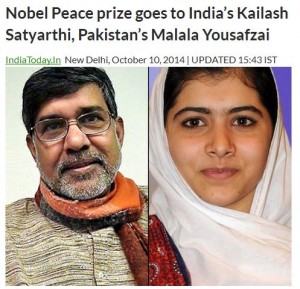 The Centre for Midwifery, Maternal and Perinatal Health would like to take the opportunity to congratulate 17-year old Malala Yousafzai on winning the Nobel Peace Prize. Her call for education for every child, especially every girl, is praiseworthy. But her work is more than a local activism; she put her life at risk. Two years ago she was shot in the head by the Taliban for advocating the education of girls and women!
The Centre for Midwifery, Maternal and Perinatal Health would like to take the opportunity to congratulate 17-year old Malala Yousafzai on winning the Nobel Peace Prize. Her call for education for every child, especially every girl, is praiseworthy. But her work is more than a local activism; she put her life at risk. Two years ago she was shot in the head by the Taliban for advocating the education of girls and women!
We know from our research in Nepal that educating girls has all sorts of positive effects. For example, it means they are likely to marry later, with is associated with having the first child later and having fewer children in total. This in turn means they have a greater chance of survival in childbirth. In Nepal the overall literacy rate (aged 5 years and above) rose from 54.1% in 2001 to 65.9% in 2011, but women (57.4%) still lag behind men (75.1%). We have seen a reduction in maternal mortality over the past two decades, which is in part driven the increase in education levels of girls.
As educators we feel strongly affiliated with her calling, but we must acknowledge that Malala was one of two winners this year. We would also like to congratulate Indian Human Rights Activist Kailash Satyarthi. Mr Satyarthi fights the grave exploitation of children for financial gain.
Malala is not only part of the minority of women who have ever won the Nobel Peace Prize, she is also the youngest ever to win the award!
Prof. Edwin van Teijlingen
CMMPH

Congratulations to Bournemouth University’s Visiting Faculty Dr. Bibha Simkhada and Prof. Padam Simkhada for the paper on financial barriers to the uptake of antenatal care in a rural community in Nepal.1 The first author (a native Nepali-speaker) conducted 50 face-to-face interviews with women and their families in rural Nepal. These interviews were thematically analysed after transcription.
This latest paper adds to our knowledge into user costs related to maternity services in Nepal as we had already published our findings on users costs in the largest obstetric hospital in the capital. 2
Professor Edwin van Teijlingen
CMMPH
References:

Congratulations to William Haydock, researcher in HSC, for his recently published paper in Capital & Class 38 (3): 583-600.
The paper “‘20 tins of Stella for a fiver’: The making of class through Labour and Coalition government alcohol policy” is available from: http://cnc.sagepub.com/content/38/3/583.abstract
Prof. Edwin van Teijlingen
CMMPH
Last year, I put together a small HEA individual grant to build upon our earlier research concerning terrorism and social work education, and civil unrest and welfare in Muslim countries. Unfortunately, the bid was unsuccessful but one should never let a good bid go to waste. Given that it was education focused, based around co-production and student enhancement – a ‘fusion’-based project! -I thought rather than try somewhere else for funding I would embed it into the third year undergraduate Sociology unit Terrorism, Protection & Society, where it would have sat if successful.
The project encourages active student engagement in learning, employing a methodology of co-production of knowledge in which skills to collaborate in producing critically informed and societally beneficial knowledge will be developed. Students are reading, critically, major UK newspapers, identifying and analysing those articles that mention ‘terrorists, terrorism or terror’ and associated concepts. From this they are engaged in identifying the processes by which our dominant cultural frames are constructed and can be challenged. The project findings, once 30-days worth of newspapers have been scoured for relevant articles, will be widely disseminated through the production of academic papers, a submission to eBU and through conference presentations.
Students following the Terrorism, Protection & Society module, engage in learning how the ‘other’, in this case ‘terrorist’, is constructed within popular debate and within the public media in the UK. As part of the project rooted within the unit, students will also analyse the media’s use of target terms (terrorist, terrorism, terror and so on) through a content and discourse analysis, and debate the potential consequences of this for contemporary society and for developing a deeper and more nuanced understanding that can assist in restraining social conflict, violence and the ‘othering’ of those who may be associated with core characteristics of ‘terrorists’ according to the socio-cultural master-narratives created by media representations.
Students will produce a paper with academic staff for the eBU on-line journal; most co-production of academic papers with students occurs at postgraduate level and this project has a degree of originality in promoting co-production of academic knowledge with undergraduate students, something we have done already in respect of edited books. Other academic outputs will be developed and students demonstrating interest and capacity will be invited to participate in their production.
Alongside the academic publications envisaged, this proposal meets BU’s fusion objectives in seeking also to add to the corpus of evidence of pedagogical benefits for students of knowledge co-creation and includes a focus on the student experience of the processes of learning.
Thus, as part of the teaching and learning students engage with, the project has wide reach and significance for student learning and pedagogical development by enhancing social and cultural understanding amongst students who will soon graduate, alongside producing autonomous and critically thinking individuals who can translate their learning and core skills into the employment market.
This week students energetically engaged with the preliminary data extraction and coding of those newspaper articles dealing with concepts and issues that were termed or could be termed as terror, terrorist, terrorism, extremism and so forth. The work undertaken helped to put in perspective some of the first two weeks’ lecture material and allowed the students to bring their own critical understandings to this complex and emotive area.
So far, the project has illuminated to me what an incredibly versatile and intellectually agile student body we have; people who will be an asset to the workforce of the future and a credit to our university! I am looking forward to the following weeks as the project unfurls.
Professor Jonathan Parker
Three members of CMMPH staff have been invited to present at the Time4you 2 conference next month.
Dr. Jen Leamon (HSC academic lead for Doctoral Professional Practice) has been invited to present a plenary session: Compassion in supervision of midwifery: Why supporting and nurturing a compassionate climate is good for women and good for health professionals.
She will also facilitate a workshop on ‘Creative writing about midwifery and birth: exploring creative approaches to learning’.
The second HSC representative, Wendy Marsh, (Lecturer Practitioner), based in HSC’s Portsmouth office is a key note speaker. Her presentation “Experience of working with safeguarding” will include stories from and photos of midwives to help members of the audience to reflect upon their experiences and to look forward in their own practise.
The third contributor is Prof. Edwin van Teijlingen who will be highlighting a sociological way of looking at childbirth and families.
Time4you 2 is being organised by the Royal College of Midwives, Learning Reps from Poole. Sara Fripp is a maternity support worker and Jillian Ireland is a community midwife and a Visiting Faculty at Bournemouth University. The conference will be held on October 15th in Bovington (Dorset).
The conference fees have been kept low to make attendance accessible to a wide audience. Tickets can be bought at: https://www.eventbrite.co.uk/e/time4you-2-tickets-10906498631
Prof. Edwin van Teijlingen
CMMPH